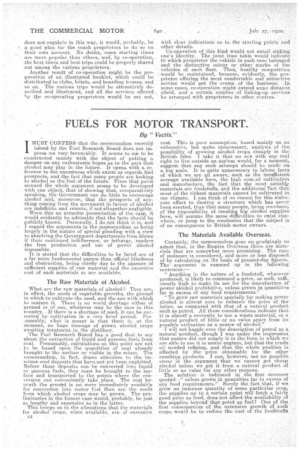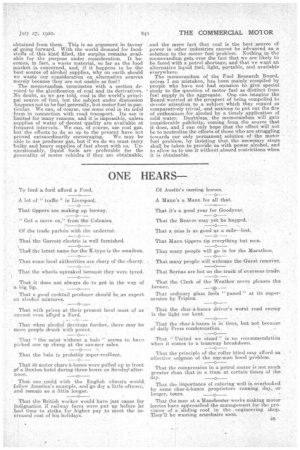FUELS FOR MOTOR TRANSPORT.
Page 2

Page 3

If you've noticed an error in this article please click here to report it so we can fix it.
By " Vect&."
IMUST CONFESS that the memorandum recentl§ .. . issued by the Fuel Research Board does not impress me very favourably. It seems to me to be constructed mainly with the object of putting a damper on any enthusiastic hopes as to the part that alcohol may play in the future. It opens with a reference to the uneasiness which exists as regards fuel prospects,. and the fact that many people are looking to alcohol as the fuel of the future. From that point onward the whole argument seems to be developed with one object, that of showing that, comparatively speaking, the Government can do little to encourage alcohol and, moreover, that the prospects of anything coming from the movement in favour of alcohol are indefinite and remote, if not altogether negligible.
Were this an accurate Presentation of the case, it would evidently be advisable that the facts should be publicly known. Personally, I do. not think it is, and I regard the arguments in the memorandum as being largely in the nature of special pleading with a. view to absolving the Government departments from blame if their continued indifference, or lethargy, renders the free production and use of Ower alcohol
impossible.
it is stated that the difficulties to, be faced are of a far more fundamental nature than official blindness and obstruction, being chiefly due to the absence of sufficient supplies of raw material and the excessive cost of such materials as are available.
The Raw Materials of Alcohol.
What are the raw materials of alcohol? They are, in effect, the seeds of vegetable. growths, the ground in which to cultivate the seed, and the sun with which to mature it. There is no world shortage either of ground or of sun, whatever may be the case in this country. _If there ia a shortage of seed, it can be.cormeted by cultivation in a very brief period.. Pro sumahly, what is meant is that there is, at the moment, no huge tonnage of grown alcohol crops awaiting treatnent in the distillery.
The Fuel Research Board has a good deal to say about the extraction of liquid and gaseous fuels from coal. Presumably, calculations on this point are not to be based upon. the quantities of coal already brought-to the surface or visible in the mines. The memorandum, in fact, draws attention to the immense coal deposits that have/not yet been exploited. Before those deposits can -be converted into liquid or gaseous fuels, they must be brought to the surface and transported to the points where the conversion can conveniently take place. The opal beneath the grourid is no, more immediately available for conversion into motor .fuel than are the seeds from which alcohol crops may be grown. The preliminaries in the former case would, probably, be just as lengthy and expensive as in the latter.
This brings us to the allegations that the materials for alcohol crops, when available, are of excessive c4
cost. This is pure assumption, based mainly on an exhaustive, but quite unnecessary, analysis of the possibility of growing alcohol crepe cheaply in the British isles. I take it that no on-e with any. real right to live outside an asylum would, for a moment. suggest that any such attempt should be made on a. big scale. It is quite unnecessary to labour facts of which we are all aware, such as the insufficient acreage available here, the high cost of cultivation and manufacture, the fact that the most ,suitable materials. are foodstuffs, and the additionarfact that most. of the richest materials cannot he cultivated in our climate. I can think of no reason for this elaborate effort to destroy a structure which has never been erected, than that many people, being convincer?, of 'the impossibility of creating big alcohol supplieS -here, will assume the same difficulties to exist et'aewhere, or jump to the conclusion that the subject is
of no consequence to British motor owners. •
The Materials Available Overseas.
Certainly, the memorandum goes on grudgingly to admit that, in the Empire Overseas there. are mate rials that are'somewhat more promising. The caso of molasses is considered, and" moreor less disposed of by calculating on the basis of present-day figures. The argument is aumnied up in the fallowing 'sentences:— " Anything in the nature of a foodstuff, wherever produced, is likely to command a price, as such, suffi ciently high to make its use for the manufacture of power alcohol prohibitive, unless grown in quantities far in excess of any food requirements."
" To grow raw materials specially for making newer alcohol is almost sure to enhance -the price of the
latter, as compared with that of a natural product such as petrol. All these considerations indicate that it is alincrg a necessity touse a waste material, or a natural product of little or no value apart from its possible utilization as a source of alcohol." I will not haggle over the description of petrol as a natural product, though I was under the impression that nature did not supply it in the form in which we are able to use it in motor engines, hut that the crude oil needed refining, and that the whole position is affected by the' price obtainable for the other resulting products. I can, hewever, see no possible, sense in the argument that we cannot get cheap alcohol unless we get it from a natural product of little or no value for any other purpose. The solution is indicated in the first sentence quoted—" unlest grown' in quantities far in excess of any food requirements." Surely the fact that, if we grow an immense quantity of some particular crop, the supplies up to a certain point will fetch a fairly good price as food, does not affect the availability of the supplies beyondthat point as fuel? One of the first consequences of the extensive growth of such crops would be to reduce the cost of the foOdatuf-0 obtained from them. This is an argument in favour of going forward. With the world demand for foodstuffs of this kind filled, the surplus remains available for the purpose under consideration. It becomes in fact, a waste material, so far as the food market is concerned, and, if it happens to be the best source of alcohol supplies, why on earth should we waste our consideration on alternative sources merely because they are not usable as fuel? The memorandum terminates with a section devoted to the glorification of coal and its derivatives. No doubt, as we aretold, coal is. the world's principal source of fuel, but the subject under discussion happens not to be fuel generally, but motor fuel in par-. tieular. We can, of course, use some coal in its goiid form in connection with road transport. Its use is limited for many reasons, and it is impossible, unless supplies of water of -decent quality are available at frequent intervals. We can, of course, use coal gas, but the efforts, to do so up to the present have not proved extraordinarily encouraging. We may be able to use producer gas, but if we do we must carry bulky and heavy supplies of fuel about with us. Unquestionably, liquid fuels are preferable for the generality of motor vehicles if they are obtainable, and the mere fact that coal is the best souree of power in other industries cannot be advanced as a solution to the motor 'fuel problem. Nothing in the memorandum gets over the fact that we are likely to be faced with a petrol shortage, and that we want an alternative liquid fuel, light, portable, and available everywhere. The memorandum of the Fuel Research Board, unless I am mistaken, has been mainly compiled by people who have not had occasion to give special ' study to the question of motor fuel as distinct from fuel supply in the aggregate. On can imagine the Board worried at the prospect. of being compelled to devote attention to a subject which they regard as comparatively trivial, and anxious to put out the fire of enthusiasm for alcohol by a timely application of cold water. Doubtless, the memorandum will gain considerable publieity, coming from the source that it does, and I Can only hope that the effect will not be to neutralize the efforts of those who are struggling towards our only permanent solution of the motor fuel problem, by insisting that the necessary steps shall be taken to provide us with power alcohol, and to allow us to use it without absurd restrictions when it is obtainable.




























